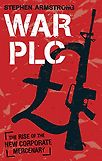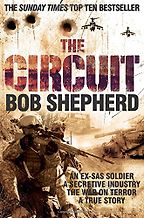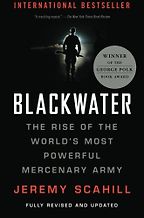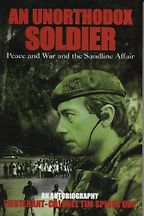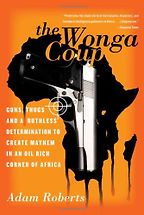Your first choice is Bob Shepherd’s book The Circuit.
This is a true story about an ex-SAS man. It’s a good example of how the private security industry has evolved, from a first-person perspective. Bob Shepherd left the SAS and joined the private security industry before Iraq kicked off. At that point, the private security industry was very much a nod-and-a-wink game. It was really just for the elite special forces. If you were a quality SAS person at the end of your time in the forces you would join a private members’ club near Harrods. In those days, the group was called ‘the Circuit.’ You knew all the people involved and there weren’t that many jobs about. You’d get people like a Saudi prince coming into town and he would have his own security people, but he might have brought his daughter with him so he’d need more people to look after her.
Bob Shepherd quickly specialised in looking after journalists. He worked with CNN so most of his stories are about specific events and moments in history. For example, he was there when CNN went into Yasser Arafat’s compound in the Gaza Strip.
Bob Shepherd is a smart bloke who is very aware of how the security industry is changing and he starts to unpick that as he is going along. You get this sense of how this small group of specialised people suddenly found that the demand for their type of work had escalated. He talks about how amateurs were starting to get into this line of work, like a nightclub bouncer from the UK who turned up in Iraq, picked up an AK47 and got himself some private security work.
This book makes you remember that there are blokes who were trained as soldiers. Then the army said, ‘You’ve served your time, out you go,’ and they are doing the best they can. And can you blame them? The book de-demonises the job. Most of these people are not bloodthirsty mercenaries, they are just trying to get by using the skills they have.
Moving on to Blackwater, tell me about that.
This is the exact opposite of The Circuit, in that it is much more academic. They are both incredibly important books. Blackwater is written by a US journalist called Jeremy Scahill. The book shows the beauty of American print journalism. It is so well researched and thoroughly documented that it moves beyond a research book and into an impassioned, well-written, freely flowing account of the story of Blackwater – the security firm.
Everything is minutely covered by footnotes. And it’s important for the footnotes to be there because some of the things that he is talking about sound like they are from a bad movie. For example, Blackwater is named after a dark swamp in Virginia. The founder was a right-wing Christian ideologue who had wanted to be in the special forces but then dropped out. So he bought a load of land and built a huge military base which he allowed anyone to train in. Then through judicious payment to the Republican Party, he became important in those circles.
When the Afghan War broke out he put together people who had been training on his site and tried to get involved in some ops and it worked. He got a CIA name tag, thousands of dollars’ worth of contracts and within two years he had built up the world’s largest army with helicopters, armoured vehicles, ships, and intelligence.
There are films which have come out since about Blackwater which you might think are ludicrous, but when you read the book you realise that this is actually what really happened. What he’s really talking about is how the Bush administration had a doctrine of privatisation which was at the very heart of its approach to Iraq.
So where does your next book, Private Contractors and the Reconstruction of Iraq, take us?
Christopher Kinsey is probably at the leading edge of studying this industry. He works at King’s College in London and at the Joint Services Command and Staff College, which is like the university for the armed forces. So he has unrivalled access. He wrote a very successful first book which was an overview of how private contractors started, and with this second book he is looking at the effect they are having in places like Iraq and Afghanistan. Iraq really was unlike any other war in our lifetime in that it was so astonishingly privatised. The private contractors on the ground were roughly the same size as the US army.
That is a key philosophical thread for the West at the moment – the idea of contracting out force. It leads to the idea of what is the definition of a state. The book’s not a racy read but if you are intrigued by the implications of all this contracting out work it’s a very interesting read. There’s this real idea of the philosophical shift that has been going on during the last 20 years in how people manage war.
Your next book is an autobiography by Tim Spicer: An Unorthodox Soldier: Peace and War and the Sandline Affair.
Yes, Tim Spicer is the closest thing to the father of the private security industry you are going to hear from. He is most famous for the Sandline affair which is sometimes known as the Arms-to-Africa affair. It is about his private security company, Sandline International, selling weapons to the legitimate but ousted government of Sierra Leone and the British military force there. The British navy in particular had been refuelling Spicer’s helicopter and helping him out. And there was a scandal about that because there was supposed to be a UN embargo on any sales of weapons to the country. How was this happening? There were lots of complicated political things going on.
Spicer was involved in a very significant moment in the history of the private security industry, which is when a group of South African Special Forces set up a company called Executive Outcomes, the first of these large-scale private security companies, at the beginning of the 90s. Spicer was recruited by the two men who had originally set up Executive Outcomes. So he was there on the ground for the whole thing.
It’s a ripping yarn about the start of the Sandline days. Unfortunately, the book doesn’t get on to what’s happening now. But it’s a good historical book.
Finally, The Wonga Coup by British journalist Adam Roberts, about the failed attempt to overthrow the ruler of Equatorial Guinea, Obiang Nguema, in 2004.
The British invented the modern private security industry in Yemen in the early 1960s because there was a civil war in Yemen that threatened Aden – the last imperial outpost of any use to anyone. We couldn’t go to war because we had just lost out in the Suez Crisis and it was very clear that we couldn’t act anymore without the US coming in. So what the Yemen government did was recruit directly a group of people led by the founder of the SAS. In this group were the legendary mercenaries of the 70s like Bob Denard.
At the end of the campaign in Yemen, they split into two groups. One group went on to found the private security industry as we know it. These were the people who founded the company Control Risks.
The other group went on to become a wild-eyed, African-dictator-toppling gang of mercenaries. Belonging to that last group Simon Mann. I suspect that we will never see the likes of the Wonga Coup again. It was a ludicrous scheme stuck in the past and the idea that you can just turn up with a bunch of blokes on a plane, overthrow the dictator and get the mineral rights. He was rumbled from the very beginning, before he even got on the plane. Every single secret service in the world was waiting for him.
Why didn’t he realise that?
Because, bless him, he’s an Eton schoolboy who was in the Guards. The whole gang of them weren’t the sharpest tools in the box. Mark Thatcher, who was in charge of them, got lost in the desert when his mother was prime minister. It will be interesting what happens now that Simon Mann is free.
So all this was going on and, meanwhile, Mann’s former partner in Sandline, Tim Spicer, has a four-hundred-million-dollar contract with the Pentagon. Which way is it going to go in the future? The Wonga Coup talks about what can never happen again. Private security companies are huge now and all over the world. The mercenary adventurer is something the British have always done, to our moral detriment but to our financial advantage. Simon Mann is the last of those and this is his story.
December 3, 2009. Updated: June 25, 2023
Five Books aims to keep its book recommendations and interviews up to date. If you are the interviewee and would like to update your choice of books (or even just what you say about them) please email us at [email protected]
Five Books interviews are expensive to produce. If you've enjoyed this interview, please support us by donating a small amount.

